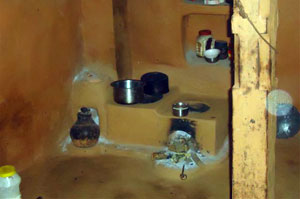 WINROCK INTERNATIONAL CLEAN SWITCH: Many households in Dhading have replaced traditional stoves with Improved Cooking Stoves helping cut carbon emission. |
But, one bank has offset its carbon use by investing in improved stoves. When the proprietors of Ace Development Bank in Kathmandu found out through a carbon audit that their company emitted 250 tons of greenhouse gases into the atmosphere, and they decided to do something about it.
The bank purchased emission reductions of 2,800 tons from the Dhading-based community organisation, Rural MutuaI Development (RMD) for Rs 360,000. The Emission Reduction Purchase Agreement, between Ace as buyer and RMD as coordinating and managing entity, for nearly 2,000 fuel-efficient stoves has set a milestone for voluntary purchase of carbon credit to promote renewable energy in the country. The revenue generated from this carbon offset initiative will be utilised for further promotion of improved cooking stoves in Dhading.
 |
By burning firewood more efficiently, each improved cooking stove reduces on average 1.5 tons of carbon from being emitted annually. And because the stoves are smokeless, they also reduce the incidence of lung infections, especially among children. In Dhading alone, the 1,935 improves stoves that Ace has financed saves about 2,800 tons of carbon dioxide from being emitted into the atmosphere every year. The environmental group Winrock International is working with the Alternative Energy Promotion Centre (AEPC) to promote improved cooking stoves in Nepal, and hopes to install over 5,000 such fuel-efficient stoves in Dhading, Sindhupalchok and Dailekh districts.
"We hope to finalise more carbon trading projects with banks in a few months," says Binod Prasad Shrestha of Winrock International. For banks like Ace, verified emission reductions offer a way to offset unavoidable carbon emissions and thus contribute to the protection of the environment.
 |
Besides trading in carbon, Ace harvests rain water at its new head office in Naxal, and is fully lit by energy-efficient LED lights, which are solar powered. Ace has also contributed to rhino conservation and helped upgrade the rhino enclosure at the Central Zoo in Jawalakhel.
"We are yet to make the switch to total renewable energy," says Pandey. "So for the time being, we are doing our bit by buying carbon offsets locally from a certified project," Pandey said. The Kyoto Protocol helped set up the Clean
Development Mechanism (CDM) to allow developed countries flexibility in meeting their emission obligations by offsetting their emissions and purchasing carbon credits from countries like Nepal through forestry or renewable energy projects that help reduce greenhouse gas emissions. The Certified Emission Reduction (CERs) can then be further traded in the international carbon market.
 Ace Development Bank uses electric cars to reduce its carbon footprint and also harvests rain water. |
One biogas plant helps stop 60,000 tons of carbon from being spewed out into the atmosphere when the methane generated by fermented cowdung replaces firewood as fuel. However, Nepal is still way behind India and China in cashing in on the Clean Development Mechanism.
Says Raju Laudari of AEPC: "We lack research based baseline data. For instance, we don't even have the data to quantify the immense potential of our hydropower and how much carbon it will replace." And although the government wants to encourage the private sector in carbon trading, it lacks clear guidelines and expertise.
The climate for carbon trading is not conducive because of its plummeting price in the international market. Carbon was trading at up to 30 Euros per ton in 2008, while the current price hovers around 1 Euro, making carbon trading much less feasible than before. In addition, the entire CDM process has come under fire in Europe because of fraud, and criticism from environmentalists that it doesn't really reduce total greenhouse gas emissions. But at least in Nepal, Ace has shown the way to companies aspiring to be green by pioneering carbon trading.
See also:
GOBAR!, NARESH NEWAR in SUNSARI
Now we know why cowdung is holy
Mean green
Going green is no longer a fad, but a necessity. Meet the exhibitors at Nepali Times eco fair to learn innovative ways to be environment friendly.
Why Nepal needs Kyoto, BIKASH PANDEY
There is a reward at the end of the rainbow


